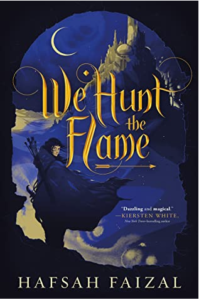I was so chuffed to learn about this Arabian-inspired fantasy YA novel by an American niqabi, which had been getting so many rave reviews! I had to keep putting off reading it for one reason or another, but was so pleased to finally have time to settle in with it over the weekend. I was further excited to hear that it doesn’t actually have any Muslim representation, as Hafsah Faizal wants to point out that the people and myths of the Arabian peninsula are not a monolith: a very laudable aim.
 So I was really perturbed to find myself already sludging through the prose from the first chapter onwards. It can take me some time to adjust to an author’s writing style so I was happy to keep persevering, but it soon got to the point where I felt that editors just gave up trying to form this mess into something readable. The prose reads as if it was written in another language before being translated back, and rather indifferently, to (mostly) standard English. The grammar was sloppy and the attempts at poetic fillips incredibly sophomoric. If I had to read the word “exhale” used as a noun one more time, I was going to hug a Ted Chiang collection to death (Exhalation is on my To-Read list, btw!) In short, this was some of the most ghastly professionally-edited English-language writing that I’ve ever read.
So I was really perturbed to find myself already sludging through the prose from the first chapter onwards. It can take me some time to adjust to an author’s writing style so I was happy to keep persevering, but it soon got to the point where I felt that editors just gave up trying to form this mess into something readable. The prose reads as if it was written in another language before being translated back, and rather indifferently, to (mostly) standard English. The grammar was sloppy and the attempts at poetic fillips incredibly sophomoric. If I had to read the word “exhale” used as a noun one more time, I was going to hug a Ted Chiang collection to death (Exhalation is on my To-Read list, btw!) In short, this was some of the most ghastly professionally-edited English-language writing that I’ve ever read.
But more importantly, how was the story? In a word, ugh. In a phrase: both tropetastic and dull.
Zafira is a huntress who masquerades as a boy in her sexist caliphate in order to feed her people. She must travel through the madness-inducing mystical forest known as the Arz in order to find game, a forest that’s claimed the minds and lives of hundreds, including her own beloved father. When the Silver Witch appears, tasking her with a quest to retrieve a mysterious artifact that could help bring magic back to her devastated land, Katniss, I mean Zafira, has little choice but to accept.
The son of the sultan who rules the five caliphates of Arawiya with an iron fist is also that sultan’s premier assassin, Nasir the Prince of Death. When Sultan Ghameq hears about Zafira’s quest, he sends Nasir and his best general Altair to follow her and, when she finally finds the artifact, to kill her and bring it back for him. Only everyone thinks she’s a boy, and then bla bla bla, ugh, it was cornball central, all of the plot twists were telegraphed from a mile away, the banter managed to be simultaneously forced and juvenile, and all the characters were drawn with excruciatingly broad brush strokes that gave them each the depth of a coat of paint. Their capabilities were always secondary to how the plot needed to be advanced, so there was very little consistency or logic to it all. Why did Zafira have to stand on that one stone to stay safe? Who knows! It’s never explained! I’d complain that everything was so underwritten only it was also badly written, and there’s only so much terrible writing I can stomach. This was honestly so painful to read, and I was doubly mad at it because I really wanted it to be good!
That said, lots of people seem to think highly of it. Time Magazine even put it on its recent list of Top 100 Fantasy Novels Of All Time! If you feel that that list was not at least 30% utter hogwash as I do, maybe you’ll appreciate We Hunt The Flame — which, admittedly, is an awesome title that comes from one of the lovelier pieces of writing in the book — more than I did. And hey, gorgeous cover! Seriously, tho, if you want to read decent to excellent Arabian fanfic, I’d strongly recommend S. A. Chakraborty’s superlative The Daevabad Trilogy or powering through Alwyn Hamilton’s mediocre first novel to get to the truly astonishing stuff of her Rebel Of The Sands trilogy. But if you still want to spend your hard earned dollars on this, you can get it from
Want it now? For the Kindle version, click here.
